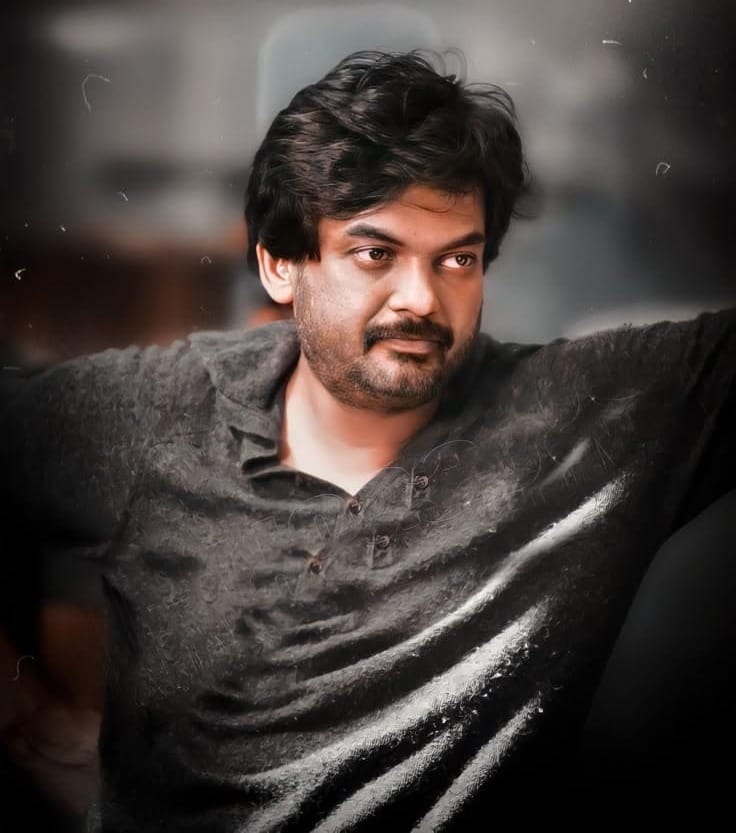The Poet of the Streets: How Puri Jagannadh Gave Voice to the Masses!
When Pokiri hit theaters in 2006, it wasn’t just a blockbuster — it was a shift. Puri Jagannadh redefined Telugu cinema with raw heroes, street charm and a voice that spoke directly to the masses. He became the true Poet of the Streets.

When Pokiri exploded across theaters in 2006, something fundamental shifted in Telugu cinema. This wasn't just another punch dialogue or mass moment – it was a declaration of war against conventional heroism. He wasn’t some zamindar’s son or a rich man’s heir. He was Pandu, a street-smart orphan who could make the most powerful men in society tremble with nothing but his attitude and intelligence.
In the sanitized world of Telugu commercial cinema, where heroes spoke in literary Telugu and villains were caricatures of evil, Puri Jagannadh arrived like a street fighter in a classical dance performance. He brought the raw energy of Pithapuram's touring talkies, the philosophical depth of Ayn Rand and most importantly the authentic voice of the common man who was tired of seeing idealized versions of himself on screen.
Today, when any Telugu hero delivers rapid fire dialogues in street slang, when they play orphans who rise through sheer willpower, when they question authority with philosophical one-liners – they're speaking in Puri Jagannadh's language. He didn't just make films, he created a new grammar for mass entertainment that made philosophy accessible through the vocabulary of the streets.

The Revolution Begins: From Touring Talkies to Tollywood
Puri Jagannadh's journey reads like one of his own scripts – a common man rising through extraordinary vision. Born on September 28, 1966, in Pithapuram, East Godavari district, his childhood revolved around his father's touring talkies business. While other children played cricket, young Puri Jagannadh sat in makeshift theaters across Andhra Pradesh, watching the same films repeatedly, observing how different audiences reacted to identical scenes.
This wasn't mere entertainment for him – it was an education in mass psychology. He noticed how laborers whistled at different moments than college students, how women connected with certain emotional beats that men ignored, how the same dialogue could provoke laughter in cities and tears in villages. These observations would later become the foundation of his universal appeal.
His formal entry into cinema came through Ram Gopal Varma, where he worked as an assistant director. But Puri was destined to create his own path. When he debuted with Badri in 2000, starring Pawan Kalyan he immediately established his signature style – fast-paced narratives, street smart dialogues and heroes who felt real despite their larger-than-life actions.

But it was Idiot (2002) with Ravi Teja that truly announced his arrival. The film's protagonist wasn't your typical Telugu hero – he was impulsive, flawed, vulnerable yet ultimately heroic through his choices rather than his circumstances. The film's success proved that audiences were hungry for characters who reflected their own complexity rather than idealized perfection.
The Language Revolution: Making Philosophy Street Smart
What sets Puri Jagannadh apart isn't just his ability to write punchy dialogues – it's his unique fusion of philosophical depth with colloquial accessibility. His characters don't speak in the literary Telugu of traditional cinema or the artificial mass dialogues of typical commercial films. They speak in the authentic rhythms of everyday conversation, yet every line carries deeper meaning.
Think about how his characters talk. They're not giving speeches or reciting poetry. They're having conversations that sound like what you'd hear at a tea stall but with ideas that make you think long after leaving the theater. This is Puri's genius – wrapping sociological observation in street smart language.
His heroes philosophize without sounding preachy. When they discuss life, morality or society, it feels natural – like getting life advice from a local friend rather than a lecture from a professor. They question traditional beliefs, challenge authority and express complex ideas through simple, direct language that resonates with common people.
His writing process itself reflects this philosophy. Known for completing scripts in record time, Puri doesn't labor over literary perfection. He captures the spontaneous energy of real conversation, where people switch between vulnerability and aggression, philosophy and practicality within seconds. This authenticity is what makes his characters memorable – they feel lived-in rather than written.
The Orphan Archetype: Heroes Without Heritage
Perhaps Puri's most revolutionary contribution to Telugu cinema is his consistent use of orphan protagonists. In a film industry obsessed with family sentiment and generational legacy, Puri's heroes stand alone – no famous fathers to avenge, no family honor to uphold, no inherited wealth to protect. They are in the truest sense self-made.
This isn't just convenient for the story. It's a philosophical statement about individual agency versus inherited privilege. His orphan heroes – from Pokiri's Pandu to Businessman's Surya to Temper's Daya – represent pure merit. They succeed or fail based solely on their choices, intelligence and moral courage.

When you don't have a family in Puri's universe, you're liberated from certain constraints. You're not tied to roles and responsibilities that prevent you from being truly independent. These heroes are products of their choices, not their circumstances. They don't carry the burden of family expectations or the safety net of inherited connections. When they rise, it's through street smart intelligence and calculated risks. When they fall, they have only themselves to blame.
This orphan archetype resonates deeply with audiences who feel disconnected from traditional power structures. In Puri's universe, being an orphan isn't a disadvantage – it's liberation from the chains of predetermination. His heroes write their own destinies with the ink of their choices, not the blood of their lineage.
The psychological complexity of these orphan heroes sets them apart from typical masala film protagonists. They experience genuine vulnerability – Temper's Daya breaking down when confronted with his moral failings, iSmart Shankar's Shankar oscillating between bravado and deep insecurity. They're not invincible warriors, they're survivors who've learned to transform their trauma into strength.
Street Democracy: Elevating Common Voices
Puri democratized not just who could be a hero, but how heroes could speak, think and behave. His protagonists aren't refined or educated in traditional terms. They're products of the local community, where survival depends on quick thinking and psychological insight rather than formal knowledge.
The remarkable thing is how he never apologizes for his characters' lack of formal education. Instead, he celebrates their practical wisdom – the ability to read people, situations and opportunities with precision that formal education can't teach. His heroes possess what we might call "street PhDs" – deep understanding gained through experience rather than textbooks.
The democratic spirit extends to his treatment of supporting characters. Auto drivers, small time criminals, street vendors, bar dancers – traditionally marginalized figures in Telugu cinema – receive full dimensional treatment in his films. They're not comic relief or tragic victims, they're complex individuals navigating difficult circumstances with dignity and intelligence.
In Pokiri, the homeless children aren't mere props for the hero's compassion – they're sharp observers who understand their city better than any police commissioner. In Amma Nanna O Tamila Ammayi, the boxing community isn't just background color – they're a functioning ecosystem with their own codes, conflicts and aspirations.

This elevation of common voices extends to female characters who despite the commercial constraints of mass cinema often display remarkable agency. Ileana's character in Pokiri isn't just a love interest – she's a woman who makes active choices, challenges the hero and maintains her independence even in romance. The heroines in Puri's films often match the heroes in wit and determination, creating relationships based on mutual respect rather than traditional romance.
The Philosophy of Speed: Rapid-Fire Life Lessons
Puri's legendary speed – completing scripts in days, shooting films in weeks – isn't just about efficiency. It reflects his philosophical belief that life moves too fast for prolonged contemplation. His rapid fire dialogue delivery mirrors the pace of modern existence where decisions must be made instantly and opportunities seized immediately.
This philosophy resonates because it matches how we actually live. In real life, we don't get time to craft perfect responses or prepare elegant speeches. Puri's characters speak with the urgency of people who know that hesitation means losing – whether it's love, money or life itself.
This speed extends to emotional transitions. His characters can shift from comedy to tragedy, from philosophy to action, within single scenes. This isn't inconsistency – it's authentic representation of how real people navigate complex emotions without the neat compartmentalization that traditional screenwriting demands.
The transformation arcs in his films happen with believable speed. When Temper's Daya evolves from corrupt cop to crusader, it doesn't happen through extended soul-searching but through decisive moments of clarity. This reflects how real change often occurs – not gradually but in explosive moments that demand immediate response.

Cultural Impact: The Puri-fication of Telugu Cinema
The term "Puri-fication" might sound like wordplay, but it accurately describes how comprehensively his style has influenced Telugu cinema. Every mass film today carries his DNA – from dialogue patterns to character archetypes to narrative rhythms.
Before Puri, Telugu commercial cinema operated on established templates – the family drama, the revenge saga, the love story with faction backdrop. He created a new template: the existential action film where violence serves philosophy rather than mere spectacle. His fights aren't just physical confrontations, they're ideological battles between different worldviews.
The influence appears in specific innovations now considered standard: The "announcement" of item numbers where heroes directly address audiences about upcoming songs. The integration of Bangkok and other international locations not as exotic fantasies but as natural extensions of the protagonist's world. The use of English phrases within Telugu dialogues that reflect urban linguistic reality rather than Western aspiration.
His impact on acting styles cannot be overstated. The "Puri hero" archetype – intense eyes, casual body language, rapid dialogue delivery with perfect pauses – has become the default mode for aspiring mass heroes. Actors who worked with him credit him for teaching them to access raw emotions rather than performed feelings.
The Businessman Manifesto: Capitalism Meets Street Wisdom
While Pokiri might be his biggest hit, Businessman represents Puri's most complete philosophical statement. The film is essentially Ayn Rand's objectivist philosophy relocated to Mumbai's underworld, where rational self-interest drives moral choices and success comes to those who understand business principles better than their competitors.
What makes Businessman special is how it treats crime as just another business. The protagonist doesn't romanticize his choices or seek moral justification. He approaches the underworld with the cold logic of a management consultant analyzing market opportunities. Violence isn't personal, it's a tool for market dominance. Territory isn't about ego, it's about revenue streams.
In Puri's universe, intelligence trumps violence, strategy beats strength and the best criminals are essentially entrepreneurs who chose illegal markets due to circumstances rather than character. The film's treatment of Mumbai as a business ecosystem rather than mere backdrop shows Puri's analytical approach. Every character operates on profit-loss calculations, market share concerns and competitive strategies.
Women in Puri's World: Beyond Traditional Boundaries
Despite working within commercial cinema's constraints, Puri's female characters often transcend typical Telugu film heroines. They're not passive recipients of male attention but active participants in their own stories, making choices that sometimes surprise even the heroes.

His heroines speak the same confident language as his heroes. They're not shocked by crude realities or rough language – they navigate the same world with equal skill. In films like Pokiri, Idiot and Businessman, the heroines aren't trophies to be won but partners to be earned. They challenge protagonists intellectually, call out their hypocrisies and maintain independence even within relationships.
What's particularly interesting is how Puri writes mother characters. Unlike the typical sacrificing, suffering mothers of Telugu cinema, his maternal figures are understanding, progressive and supportive of their children's unconventional choices. They represent the kind of parental acceptance that resonates with young audiences struggling with generational conflicts.

Even in item numbers – often criticized as objectification – Puri's approach differs. The performers aren't mere visual spectacles but characters with agency who understand their power and use it strategically. They're entrepreneurs of desire, not victims of it.
The Puri Method: Directing Life Rather Than Cinema
Puri's directorial approach mirrors his life philosophy – trust instinct over instruction, speed over perfection, authenticity over artifice. He famously completes shoots in record time not through rushed work but through decisive clarity. Every shot serves a purpose, every scene advances character or philosophy.
His sets operate on street principles rather than film industry hierarchy. He's known for treating spot boys with the same respect as stars, creating an atmosphere where creativity flows from unexpected sources. This isn't just progressive management – it's practical recognition that good ideas come from anywhere.
The spontaneity extends to writing. He often rewrites scenes on set based on actors' natural rhythms or location possibilities. This isn't indecisiveness but responsiveness to creative opportunities. His best moments often emerge from these spontaneous decisions rather than pre-planned writing.
Legacy of the Street Poet
As Telugu cinema evolves with pan-Indian ambitions and massive budgets, Puri Jagannadh's core innovation remains relevant: giving authentic voice to mass aspirations. While others chase universal themes through genericization, he achieved universality through specificity – the more authentically his characters spoke in Andhra street slang, the more they resonated across linguistic boundaries.
His true legacy isn't in box office records or industry awards but in democratizing Telugu cinema's imagination. He proved that heroes need not come from illustrious backgrounds, that philosophy need not require literary language, that mass entertainment need not insult audience intelligence.
Every time a Telugu hero delivers rapid-fire dialogues that make crowds whistle, every time an orphan protagonist rises through individual merit, every time street philosophy gets packaged as commercial entertainment – Puri Jagannadh's revolution continues. He didn't just make films, he created a new language for Telugu cinema to express its deepest aspirations.
In an industry often divided between "class" and "mass" cinema, Puri created a third category: "mass with class" – entertainment that respects its audience's intelligence while speaking their language. He remains in the truest sense the Poet of the Streets who transformed everyday vocabulary into cinematic verse.

His vision continues to influence new generations of filmmakers who understand that authentic voice matters more than polished presentation, that philosophical depth can coexist with commercial entertainment and that the stories of common people deserve extraordinary treatment.
In this aspiration, Puri Jagannadh has succeeded beyond measure. He didn't just create successful films, he created a new cinematic language that continues to give voice to those who were waiting to hear their own stories told in their own words.
Having had the privilege of meeting Puri garu, what strikes you most is how he embodies the same philosophy his characters preach – no pretense, no filters, just raw authenticity. Perhaps that's why his cinema connects so deeply – it comes from a director who lives by the same street-smart wisdom he puts on screen.


